Understanding Warranty Protection for Your Business Investments
What is the warranty period? A warranty period is the specific timeframe during which a manufacturer or seller guarantees to repair, replace, or refund a product if it fails to meet promised quality or performance standards. This protection typically ranges from 90 days to several years depending on the product type.
For quick reference:
| Product Type | Typical Warranty Period |
|---|---|
| Consumer Electronics | 1 year |
| Automobiles | 3-5 years or 36,000-60,000 miles |
| Mortuary Coolers (panels) | Up to 15 years |
| Mortuary Cooling Units | 1-2 years parts and service |
| Home Appliances | 1-2 years |
The warranty period represents a crucial window of protection for your business investments. During this time, you're entitled to specific remedies should a product fail due to manufacturing defects or workmanship issues. Understanding exactly when this period begins (usually at purchase or delivery date), what it covers, and how to maintain valid coverage can save your funeral home thousands in unexpected repair or replacement costs.
As a funeral director managing essential equipment, knowing the specifics of your warranty periods isn't just administrative paperwork—it's financial protection for equipment critical to your daily operations.
I'm Mortuary Cooler, a national-level supplier of mortuary refrigeration systems with extensive experience helping funeral directors understand what is the warranty period for their essential equipment. My expertise includes navigating the complexities of warranty terms to ensure our clients maximize their protection.
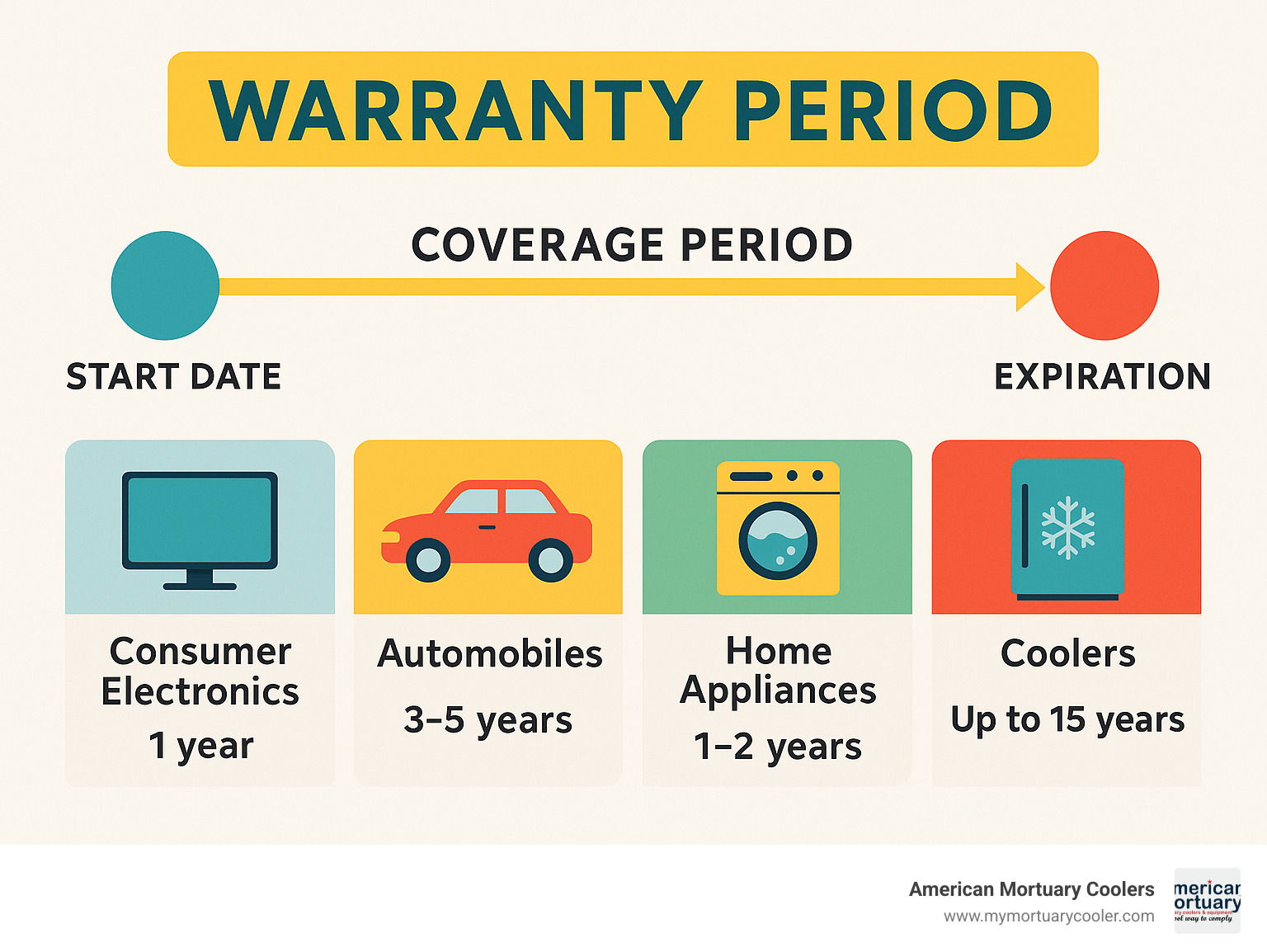
Must-know What is the warranty period terms:
What is the Warranty Period?
A warranty period is that golden window of time when you're protected if something goes wrong with your purchase. Think of it as a safety net—a legally defined timeframe during which the manufacturer stands behind their product, promising to fix or replace it if it doesn't work as it should.
When you buy something important for your business (like a mortuary cooler), this isn't just fine print—it's peace of mind with legal backing.
Under U.S. law, two main frameworks govern these promises:
- The Magnuson-Moss Warranty Act (1975), which requires companies to explain their warranties in clear language (no more hiding behind legal jargon!)
- The Uniform Commercial Code (UCC), which establishes implied warranties that automatically protect your purchase even when nothing is explicitly stated
A warranty isn't just a nice gesture—it's a legally binding commitment that your new investment will perform as advertised for a specific period.
For perspective, Tesla vehicles come with a Basic Vehicle Limited Warranty covering 4 years or 50,000 miles (whichever happens first), while their Battery and Drive Unit warranty extends to 8 years with a promise to maintain at least 70% battery capacity. That's confidence in their product!
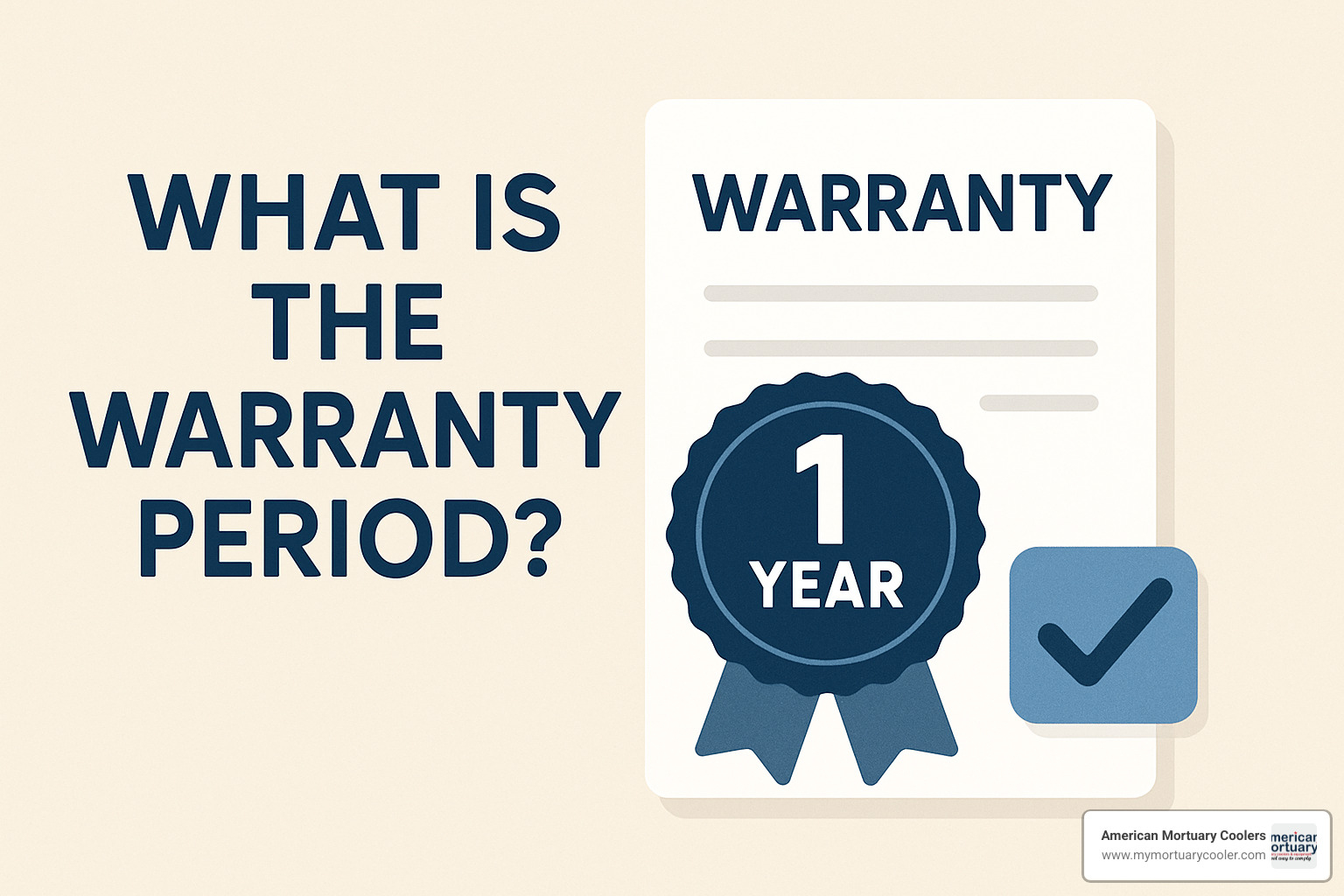
When Does the Warranty Period Start and End?
The clock on your warranty typically starts ticking at one of these moments:
- Date of purchase – The day you sign the paperwork and hand over payment
- Date of delivery – When that shiny new product arrives at your doorstep
- Date of installation – For products that need professional setup (like many mortuary coolers)
Think about a watch warranty—it usually begins the moment the retailer stamps your warranty card with the purchase date.
As for when your warranty protection ends, it's usually when:
Your time runs out (the 1-year mark passes) You hit a usage threshold (like 50,000 miles on a vehicle) Performance drops below a guaranteed level (such as battery capacity)
Here's a crucial tip from our experience: most warranties require you to report problems before the warranty expires—not just that the problem started during the warranty period. As the Federal Trade Commission warns, finding a problem on day 30 but reporting it on day 61 of a 60-day warranty often leaves you without coverage. Don't let that happen to you!
What is the warranty period for different product categories?
Warranty periods vary widely across different types of products, reflecting their expected lifespan and complexity:
Consumer Electronics typically come with a 1-year warranty covering parts and labor. Premium brands might offer 2-3 years, though batteries often get just 6 months of coverage (if they're covered at all).
Vehicles generally offer tiered protection: a 3-5 year basic warranty for most components, a longer 5-10 year powertrain warranty for the engine and transmission, and specialized coverage like Tesla's impressive 12-year unlimited-mile rust warranty.
Mortuary Coolers feature some of the industry's most robust warranties, with panels often protected for up to 15 years—one of the longest component warranties you'll find anywhere. Cooling units typically carry 1-2 year coverage for parts and service, while doors and hardware usually get 1 year of protection.
Photovoltaic Modules (solar panels) typically offer 10 years of protection against defects, plus a 25-year performance warranty guaranteeing they'll still produce at least 80% of their rated power after a quarter-century of use.
HVAC Systems usually provide 1-2 years on parts, with premium components like compressors often covered for 5-10 years, though labor typically only gets 1 year of coverage.
At American Mortuary Coolers, we understand that when you invest in refrigeration equipment for your funeral home, you need reliability you can count on for years to come. That's why we align our warranty periods with industry-leading standards, particularly for our panel systems—the backbone of your cooling unit's structural integrity. Whether you're in the Southeast, Southwest, Midwest, Northeast, or Pacific regions, what is the warranty period shouldn't be a mystery but a clear promise of our commitment to your business.
What's Covered — and What's Not
Let's talk about what your warranty actually protects. After all, knowing how long your warranty lasts is only half the battle – understanding what's actually covered during that time is where the real value lies for your funeral home business.
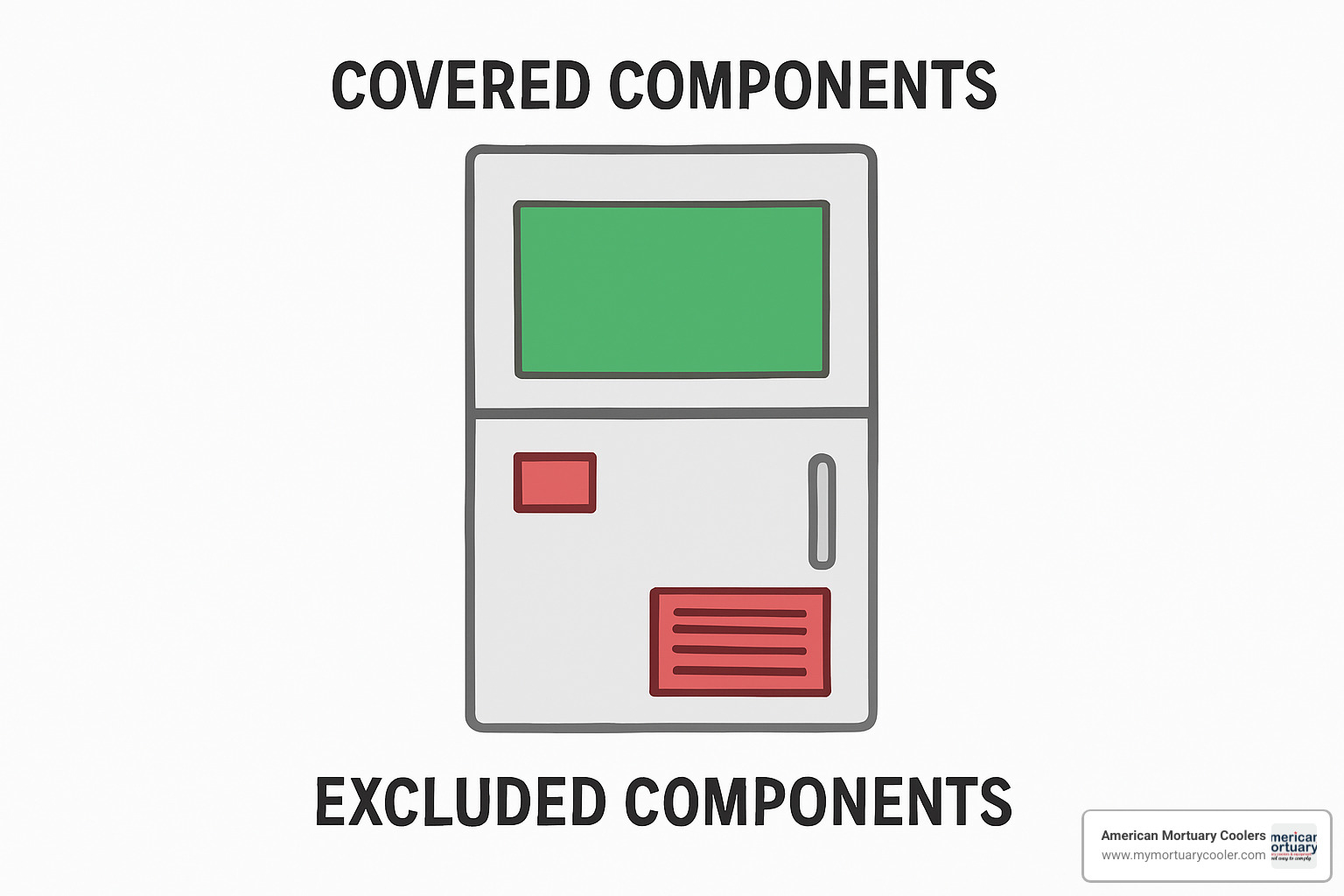
Scope of Coverage During the Warranty Period
When you purchase a mortuary cooler or any major equipment, your warranty typically acts as a safety net for certain issues. Think of it as your protection plan against problems that weren't your fault.
During a valid warranty period, you're generally covered for:
Manufacturing defects that happened at the factory – like when panels aren't properly sealed or electrical components weren't installed correctly. These aren't your fault, and manufacturers know it.
Workmanship issues are similar but focus on how well the product was put together. Even with perfect materials, poor assembly can lead to failures down the road.
Functional failures occur when your equipment simply doesn't work as promised. If your mortuary cooler can't maintain the temperature range specified in your purchase agreement, that's a functional failure covered by most warranties.
What happens when something goes wrong? Your warranty might offer:
Repairs at no cost to you, which is the most common remedy. A technician fixes the issue and you're back in business.
Replacements become necessary when a repair isn't possible or practical. This might be a new part or, in severe cases, an entirely new unit.
Refunds are less common, especially after you've been using the equipment, but they do happen in situations where repairs and replacements aren't feasible.
Tesla provides a great example of comprehensive coverage with their Battery and Drive Unit Limited Warranty. Beyond just covering failures for 8 years or 150,000 miles, they specifically guarantee your battery will maintain at least 70% of its original capacity throughout the warranty period. That's the kind of specific protection that gives real peace of mind.
For the mortuary coolers we provide at American Mortuary Coolers, we focus our warranty coverage on what matters most to funeral directors: structural integrity of panels, consistent cooling performance, reliable door seals, and properly functioning control systems. We understand that in the funeral industry, equipment downtime simply isn't an option.
Exclusions, Limitations & Voided Warranties
Now for the reality check – what's typically not covered in your warranty.
Almost every warranty excludes normal wear and tear. Just like your car's tires eventually wear down with use, certain parts of your equipment will naturally degrade over time.
Consumable parts like filters and batteries usually have shorter coverage periods or none at all, since they're designed to be replaced regularly.
Cosmetic damage – those scratches and dents that don't affect how your equipment works – typically won't qualify for warranty service. The same goes for damage from misuse, accidents, or environmental factors like water damage or power surges.
Be especially careful about unauthorized modifications. Having your maintenance person make "improvements" to your mortuary cooler might seem like a good idea, but it could instantly void your warranty protection.
For mortuary coolers specifically, warranty coverage is typically voided by actions like:
Connecting the unit to improper electrical supply (using the wrong voltage) Placing condensing units in closets or spaces without adequate ventilation Allowing unqualified personnel to handle refrigerant Modifying temperature controls to achieve settings outside recommended ranges Moving equipment without professional assistance
Here's some good news: the Magnuson-Moss Warranty Act protects you from being forced to use only the manufacturer's replacement parts. As long as the parts you use meet specifications, your warranty remains valid – giving you more flexibility in maintaining your equipment.
At American Mortuary Coolers, we serve funeral homes across Tennessee, Georgia, Illinois, South Carolina, Texas, California, New York, Pennsylvania and beyond with clear warranty terms that protect your investment without hidden loopholes. We believe in explaining exactly what is the warranty period and what it covers in plain English – because you have enough to worry about without deciphering legal jargon.
Types of Warranties & Their Impact on the Period
When it comes to protecting your investment, not all warranties are created equal. The type of warranty you have significantly affects both how long you're covered and what exactly is protected – crucial information for any business owner with essential equipment like mortuary coolers.
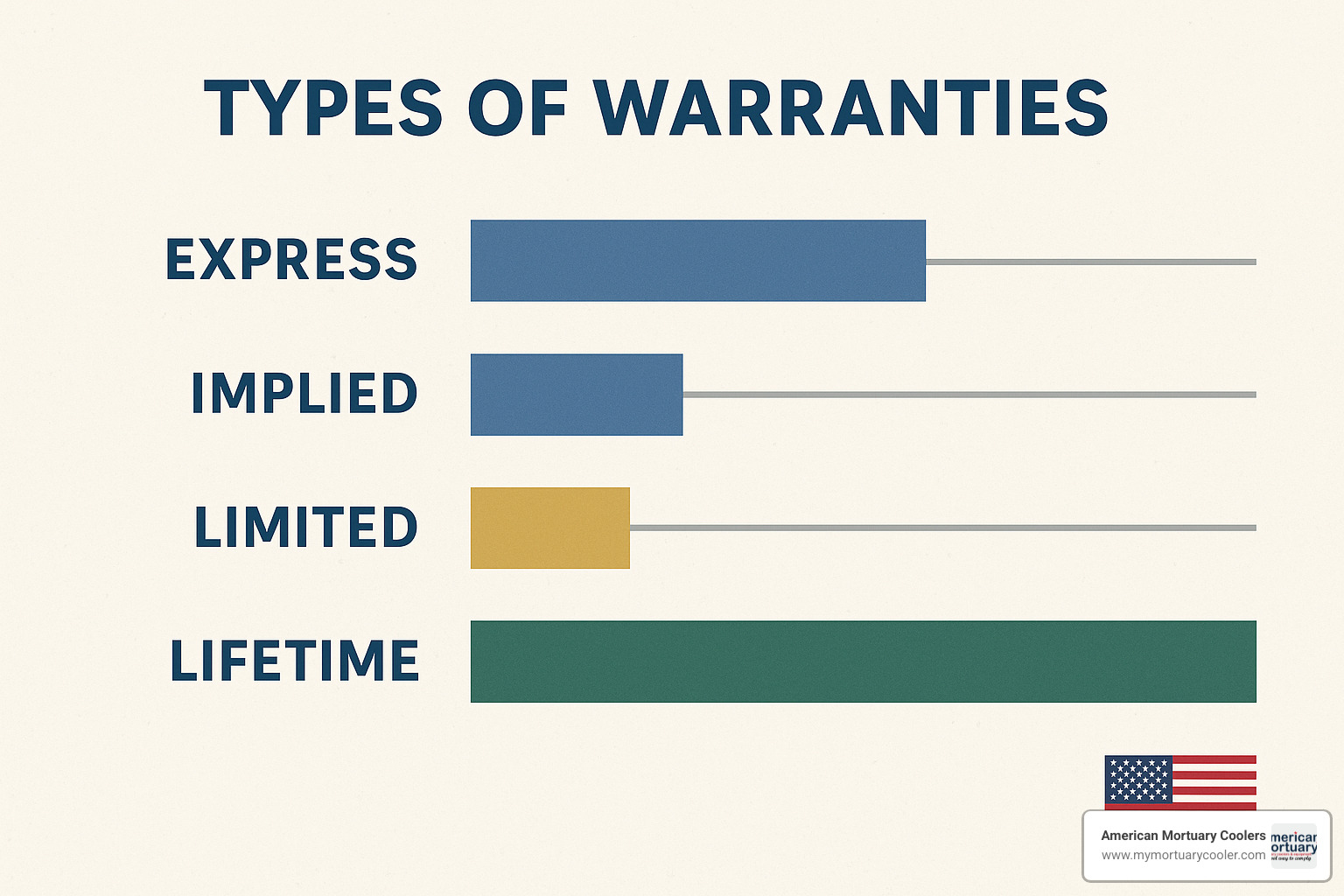
Express vs Implied Warranty Periods
Express warranties are the promises a company explicitly makes about their product. You'll find these in writing on warranty cards, mentioned in advertisements, stated by salespeople, or demonstrated through product displays. These warranties clearly spell out how long you're covered – typically anywhere from 90 days to several years depending on what you've purchased.
"I see this all the time with our clients," says our warranty specialist. "They focus only on the express warranty period printed on their paperwork, not realizing there's often additional protection under the law."
That additional protection comes from implied warranties, which automatically exist under state laws and the Uniform Commercial Code (UCC). You don't need paperwork for these – they're your rights as a consumer. The two main types are:
Implied Warranty of Merchantability – This is the basic promise that the product will do what it's supposed to do. Your mortuary cooler should, well, cool. Seems obvious, but this legal protection matters.
Implied Warranty of Fitness for a Particular Purpose – This kicks in when a seller knows why you're buying something and helps you select the right product based on their expertise.
While express warranties have clearly defined timeframes, implied warranties typically last for four years from purchase in most states. That's right – even if your written warranty expires after one year, you may still have three more years of legal protection under implied warranty laws!
What's particularly interesting (and helpful for you as a consumer) is that the Magnuson-Moss Warranty Act prevents sellers who offer written warranties from disclaiming these implied warranties. So that "90-day limited warranty" might actually come with four years of implied protection by law. Good to know, right?
How Extended Warranties and Service Contracts Modify the Warranty Period
Think of extended warranties and service contracts as insurance policies rather than true warranties. They typically:
Begin when the manufacturer's warranty ends (though sometimes they overlap) Add extra years of protection May cover issues the original warranty excludes Usually cost extra – often 10-30% of the product's price
For essential equipment like mortuary coolers, these extended protections often focus on crucial components like compressors (extending coverage to 5 years in many cases), labor costs beyond the standard warranty period, emergency service response guarantees, and even scheduled maintenance visits.
"One of our Tennessee clients saved over $3,000 last year when their compressor failed just after the standard warranty expired," shares our service manager. "Their extended service contract covered both parts and labor – a decision that really paid off."
At American Mortuary Coolers, we understand that funeral homes from Chicago to Los Angeles need equipment they can count on with predictable operating costs. That's why we offer straightforward extended service options that clearly define what happens after the standard warranty period ends.
When deciding if an extended warranty makes sense for your business, consider the equipment's reliability history, compare typical repair costs against the warranty price, think about how equipment downtime would impact your operations, and check service technician availability in your area.
International & Transferable Warranty Periods
If your business has multiple locations or you might relocate or resell equipment in the future, you'll want to understand two additional warranty considerations:
International Warranties often come with geographic limitations. They may only be valid in the country of purchase, have different terms across borders, require original documentation, or need validation by local distributors. Watch warranties, for example, typically only apply in the purchase country. Planning to use or gift something abroad? Check with the manufacturer first to avoid surprises.
Transferable Warranties follow the product when ownership changes hands – a valuable feature for long-lasting investments like mortuary coolers. These warranties may require formal transfer procedures, have modified terms for new owners, and can significantly add value when selling used equipment.
Tesla's vehicle warranties provide a good example – they follow the vehicle and transfer to new owners when the ownership change is properly documented with Tesla.
For substantial investments like mortuary refrigeration systems with long service lives, warranty transferability can significantly impact resale value. When buying used equipment or selling your facility, understanding the remaining warranty period and transfer requirements helps ensure accurate valuation.
For our clients across the 48 contiguous states we serve, from rural funeral homes to urban mortuaries, we're always happy to explain exactly how our warranties work and what happens if ownership changes hands. After all, clear communication about your warranty period is just as important as the protection itself.
Latest research on consumer warranty law
Maximizing Your Warranty Period & Handling Claims
Knowing your warranty period is only the first step—maximizing its value requires proactive management and proper claim procedures when issues arise.
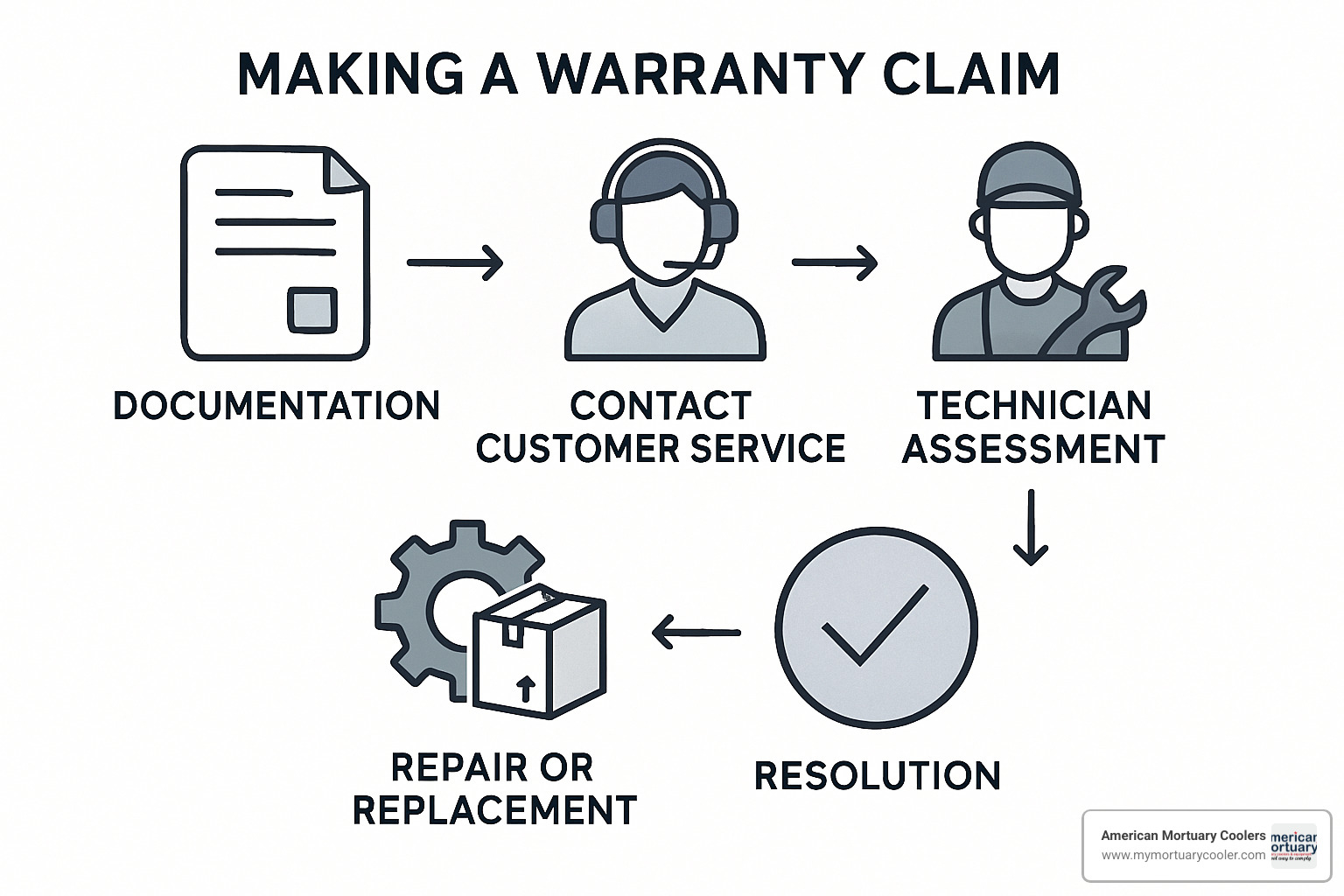
Actions to Take if a Product Fails Within the Warranty Period
When your mortuary cooler or any essential equipment fails during its warranty period, quick action can mean the difference between a smooth, no-cost repair and an unexpected expense. Think of your warranty like an umbrella—it only works if you open it before you get too wet!
First, become a documentation detective. Grab your phone and take clear photos and videos showing the problem. Jot down any error codes or specific symptoms you notice, and make note of when the issue began. This evidence creates a compelling case that's hard to dismiss.
Next, reach out to the seller with your well-documented concerns. Many folks skip this crucial first step, but most warranties actually require you to contact the retailer before escalating matters. Explain the situation clearly, referencing specific warranty coverage points. If they push back, politely request a written response—this paper trail may prove valuable later.
If the seller can't resolve your issue, it's time to connect with the manufacturer. For important communications, consider using certified mail with return receipt—it's old-school but effective for establishing a record. Include all your documentation, and specifically mention which warranty terms cover your situation. Setting a reasonable timeframe for response helps keep the process moving.
Most manufacturers have a specific Return Merchandise Authorization (RMA) process. Following these procedures to the letter—getting an RMA number, packaging correctly, shipping with tracking—shows you're serious about your claim and prevents your request from getting lost in the shuffle.
For persistent warranty headaches, don't forget you have backup. The FTC at ReportFraud.ftc.gov, your state attorney general's office, and consumer protection agencies can all provide regulatory muscle when warranted.
For mortuary coolers specifically, our team at American Mortuary Coolers recommends maintaining daily temperature logs to catch performance issues early, before they become critical failures. This proactive approach not only preserves your warranty rights but also protects your business operations. The warranty period is your window for reporting issues, not just when they occur—prompt action is essential.
Your Responsibilities During the Warranty Period
Warranty coverage is a two-way street. While manufacturers make promises about their products, you also have responsibilities to keep that coverage valid throughout the warranty period.
Using your equipment as intended might seem obvious, but it's the number one warranty-voider we see. Those owner's manuals may not make for exciting bedtime reading, but following their guidelines ensures your equipment operates within design parameters. For mortuary coolers, this means maintaining proper room ventilation and avoiding overcrowding that restricts airflow.
Regular maintenance isn't just good practice—it's often required to keep your warranty valid. Think of it like dental checkups; skipping them doesn't void your dental insurance immediately, but neglecting your teeth for years will certainly lead to problems insurance won't cover. For your mortuary cooler, this means regular cleaning of condenser coils, inspecting door gaskets, and scheduling professional service at recommended intervals. As we like to say at American Mortuary Coolers, "A clean coil is a happy coil!"
The importance of keeping detailed records cannot be overstated. Store warranty certificates somewhere safe (and rememberable!), keep all purchase receipts, and document every service visit. In warranty disputes, the funeral home with organized documentation almost always fares better than the one with a shoebox full of crumpled receipts.
Many manufacturers require product registration to activate full warranty benefits. Take five minutes to complete those registration cards or online forms—it's a small investment that could save substantial headaches later. And if your contact information changes, update your registration accordingly.
For mortuary coolers specifically, we understand the critical nature of your equipment. A failing cooler isn't just an inconvenience—it's an emergency that impacts your ability to serve families with dignity. That's why at American Mortuary Coolers, we've designed our warranty terms to account for the unique challenges faced by funeral homes across the country, from the humidity of Florida to the cold of Minnesota.
By understanding both your rights and responsibilities during the warranty period, you transform that warranty from a paper promise into genuine protection for your business investment. For more detailed maintenance guidance, check out our guide on Keep It Clean: Essential Tips for Maintaining Your American Mortuary Cooler.
Frequently Asked Questions about the Warranty Period
What is the warranty period for mortuary coolers and refrigeration panels?
When you invest in mortuary cooling equipment, you're making a significant purchase that needs to last. That's why it's important to understand the warranty coverage for each component:
Mortuary coolers typically come with different warranty periods depending on the part. The panels often carry our longest protection—up to 15 years against manufacturing defects and structural issues. This extensive coverage reflects our confidence in these critical structural components.
The cooling units themselves usually carry a 1-2 year warranty covering parts and service, while compressors (the heart of any refrigeration system) often come with 5-year protection from installation date. Electronic controls and door hardware typically include 1-year coverage for normal operation.
Here at American Mortuary Coolers, we take pride in standing behind our American-made polyurethane panels with some of the best warranty periods in the industry. We design and build these panels to withstand years of daily use in funeral homes from coast to coast—whether you're in the humid Southeast or the dry Southwest.
Warranty terms can differ between standard retail purchases and custom installations for specific projects. I always recommend verifying your exact warranty details at the time of purchase so there are no surprises down the road.
Can the warranty period be transferred to a new owner?
Funeral homes change hands, and you might wonder what happens to your equipment warranty when that occurs. The good news is that most manufacturer warranties follow the product, not the person who bought it.
However, warranty transferability isn't universal:
- Some warranties explicitly state they only cover the original purchaser
- Others remain with the equipment regardless of ownership changes
- Registration-based warranties might require a formal transfer process
For mortuary refrigeration specifically, standard manufacturer warranties on components like compressors typically transfer smoothly with the equipment. Extended service contracts, however, often need formal paperwork and sometimes a transfer fee. Custom installation warranties might have location-specific terms that affect transferability.
If you're buying or selling a funeral home with existing cooling equipment, I recommend taking these simple steps:
- Gather all the original warranty paperwork
- Contact us or the manufacturer to verify what transfers
- Complete any necessary transfer forms
- Make sure the manufacturer has updated contact information
At American Mortuary Coolers, we understand that funeral home ownership changes are a normal part of business. We design our warranty policies with reasonable transfer provisions while ensuring the equipment continues to receive proper care.
What events can void a warranty before the period ends?
Even the best warranty won't help if certain situations void your coverage. It's worth knowing what might cancel your protection before your warranty period naturally expires.
Improper installation is a common warranty-voider. This includes failing to follow manufacturer specifications, using unauthorized installation methods, or not meeting ventilation and electrical requirements. This is why professional installation is so important for complex equipment like mortuary coolers.
Unauthorized modifications will almost always void a warranty. When you alter refrigeration components, modify control systems, or change structural elements, manufacturers can't guarantee performance or safety.
Neglecting maintenance is another warranty-killer. Skipping required service intervals, using harsh or incorrect cleaning chemicals, or failing to replace wear items on schedule tells manufacturers you haven't upheld your end of the bargain.
Environmental factors beyond specifications can void coverage too. Exposing equipment to corrosive environments, operating outside temperature/humidity ranges, or damage from floods or fires typically falls outside warranty protection.
Don't overlook documentation issues either. If you can't provide proof of purchase, if serial numbers are missing or altered, or if you failed to register the product when required, your warranty claim might be denied.
For mortuary coolers specifically, we often see warranty issues arise from improper electrical connections damaging components, blocked ventilation around condensing units causing overheating, unauthorized refrigerant handling by non-certified technicians, and modifications made to accommodate non-standard uses.
That's why we at American Mortuary Coolers provide detailed installation and maintenance guidelines with all our equipment. We want funeral directors across all our service regions—from Florida to Washington state—to enjoy the full benefit of their warranty period without unexpected surprises.
Conclusion
Understanding what is the warranty period for your mortuary equipment isn't just about memorizing a date range—it's about grasping the full safety net protecting your essential business investments. Think of your warranty period as a promise backed by law, giving you real options if things don't work as they should.
Here at American Mortuary Coolers, we don't just sell refrigeration units—we provide peace of mind to funeral homes from coast to coast. Our extended panel warranties stretch up to 15 years because we believe in the quality of our American-made products. When we say our coolers are built to last, we back that statement with warranty terms that truly matter.
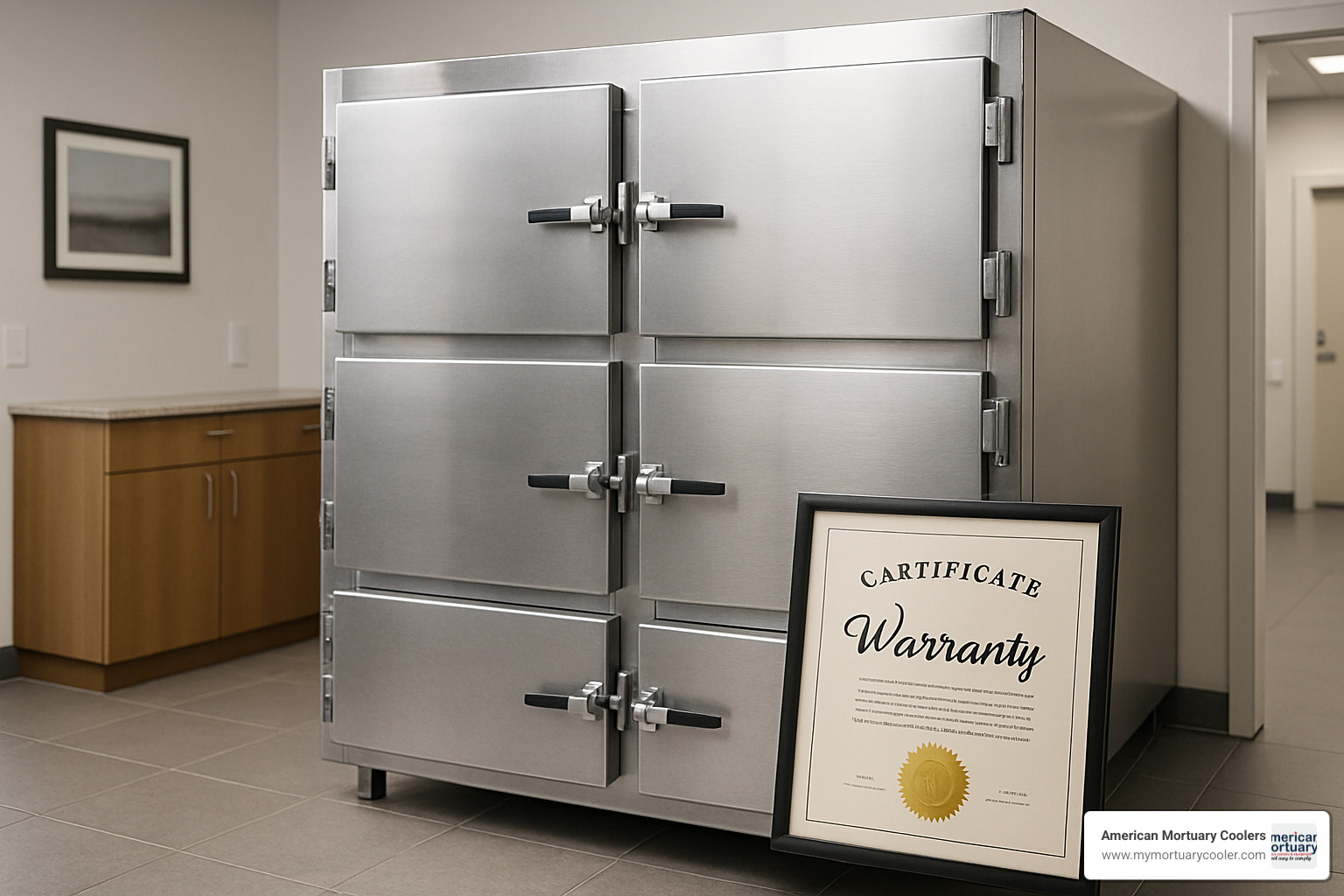
When it comes to protecting your warranty rights, remember the essentials: know your start date (whether it's when you bought it, received it, or had it installed), understand exactly what's covered (because that compressor might have different protection than the door gaskets), and keep up your end of the bargain with proper maintenance and care.
Timing matters tremendously with warranties. The moment you notice something isn't right, document it and reach out. Many funeral directors have learned the hard way that waiting even a few days past the warranty period can mean shouldering the entire repair cost themselves.
Your record-keeping habits can make or break a warranty claim. That folder with your purchase receipt, those maintenance logs, and the email trail with customer service? They're worth their weight in gold when you need to prove your case.
For funeral homes from our Tennessee headquarters to facilities in California, New York, or anywhere in between, properly understanding your warranty periods translates directly to smarter budgeting and fewer surprises. After all, in your business, reliability isn't optional—it's essential.
We'd love to walk you through our specific warranty terms for any equipment you're considering. Our team at American Mortuary Coolers can help you steer warranty considerations whether you're looking at new purchases, evaluating existing equipment, or planning a custom installation custom to your unique facility.
Knowledge is power when it comes to warranties. By fully understanding what is the warranty period and how it works, you ensure your business gets every bit of protection promised when you invested in critical equipment. And that protection isn't just paperwork—it's real financial security and genuine peace of mind for years to come.
Ready to learn more about protecting your investment? Visit Your One-Stop Shop for Mortuary Coolers to see how we can help.



















